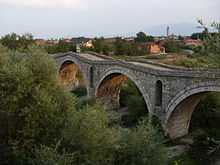Terzijski Bridge
| Terzijski Bridge | |
|---|---|
 Terzijski bridge over the Erenik river | |
| Carries | one (pedestrian) lane |
| Crosses | Erenik |
| Locale | Bistražin near Đakovica |
| Design | Multi-arch |
| Total length | 190 m (620 ft) |
| Width | 3.5 m (11 ft) |
| Opened | 15th century |
| Coordinates | 42°21′34″N 20°30′33″E / 42.35944°N 20.50917°ECoordinates: 42°21′34″N 20°30′33″E / 42.35944°N 20.50917°E |
| Monument of Culture of Exceptional Importance | |
Terzijski Bridge (Serbian: Терзијски мост, Terzijski most, Turkish: Terzi Köprüsü, Albanian: Ura e Terzive) sometimes called Tailors' Bridge,[1] is located near the village of Bistražin near Đakovica in Kosovo. It is a very important example of Ottoman bridge building in Kosovo.[2] It was built over the river Erenik, probably at the end of the 15th century, with its present appearance (from the 18th century), is a significant example of the terzijskog guild from Đakovica, from which it received its name. Major reconstruction and restoration to its original appearance were held from 1982 to 1984. Today, the bridge is under the protection of the Republic of Serbia, it was declared a Monument of Culture of Exceptional Importance in 1990.[3]
History
It is not known when exactly the bridge was built, but it is thought to have been at the end of the 15th century. That opinion is based on the fact that the bridge was erected on a medieval route, which connected Đakovica with Prizren, and the fact that the bridge was later expanded, due to changes of flow in the river Erenik. In the 18th century the bridge experienced major modifications, which gave it its current look. These works were financed by the Terzija guild from Đakovica, which is confirmed by an inscription carved in Turkish on the bridge.
The bridge was built with trimmed stones, in dark gray and an ocher shade. Its length exceeds 190 meters, the width of the original pavement was over 3.5 meters and the bridge consists of 11 rounded arches, among which are embedded niches.
References
- ↑ http://www.inyourpocket.com/kosovo/Gjakova
- ↑ http://spomenicikulture.mi.sanu.ac.rs/spomenik.php?id=81
- ↑ "Cultural monuments of exceptional significance" (Serbian Ministry of Culture) (Serbian)
See also
- Monument of Culture of Exceptional Importance
- Đakovica